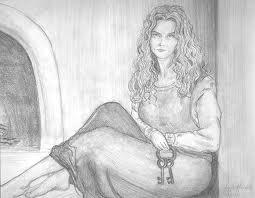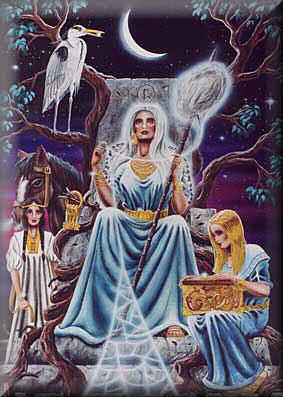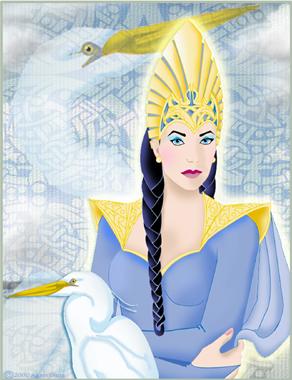Frigga is the great queen of the Asgardian deities, ruling right alongside All-Father Odin. Her origins and parentage are forgotten in the mists of antiquity, but her role and status in the cosmology of the Norse pantheon is well known and greatly respected. She is the goddess of marriage, and as such is invoked to officiate at all weddings conducted by those who follow the Norse path, as well as called upon by those who wish to find the type of love that will lead to the gates of matrimony. Her power to wield magick and her strong rapport with the natural forces of the universe--including fate itself--are well attested to. She is renowned for the ability to foretell likely alternate futures, but generally keeps the visions she receives to herself for reasons known only to her (perhaps motivated by a desire to prevent undue interference in the natural course of events by those who may dislike the outcomes depicted in her visions).
Though many of her old stories have been lost by the failure of the male-centric Christian monks who re-recorded the Norse sagas following the downfall of Pagan dominance in the Northern world to preserve them for eternal posterity, what remains of them clearly illustrate her power and majesty, not to mention her adroitness at achieving much of what she wanted whenever she disagreed with the dictates of her husband Odin. Considering the power and knowledge possessed by the All-Father, this was no small feat on Frigga's part, and it was something no other deity could accomplish with such regularity. Contrary to the great conflicts that occurred between her counterpart in the Greek pantheon, Hera, and her husband Zeus (who was Odin's counterpart in the Greek pantheon), Frigga embodied domestic understanding between the spouses but never for one instant supported a servile role for the wife before the husband, as she achieved her desires over that of Odin via guile and sheer cleverness rather than bitterness. It's therefore no wonder that the sexist Christian monks of centuries past had no great desire to record the entirety of her doubtlessly impressive stories, since she was everything the men of that era feared that a woman could be, and this attitude was no doubt the main reason why the male-dominated Catholic clergy insisted that their priests and bishops never marry or in any way engage in romantic liaisons with women.
Frigga has been nothing less than a spiritual mother figure to me since I began my devotion to the Norse deities, and she never fails to offer emotional succor and maternal advice when called upon. As such, I tend to see her more in the role of the Mother aspect of the Wiccan Triple Goddess than Freya (whom I nevertheless believe to possess a very important role of her own in the Norse schema), and she has often been envisioned as a handsome matronly woman in her middle age by those who revere her, thus befitting her great number of years of existence and her role in the lives of those who have bonded with the Asgardian pantheon of deities. She embodies the potential for a powerful, mutually beneficial relationship between two people who have established romantic love between each other, and who have therefore spiritually and emotionally bonded with each other in that inseparable manner.




